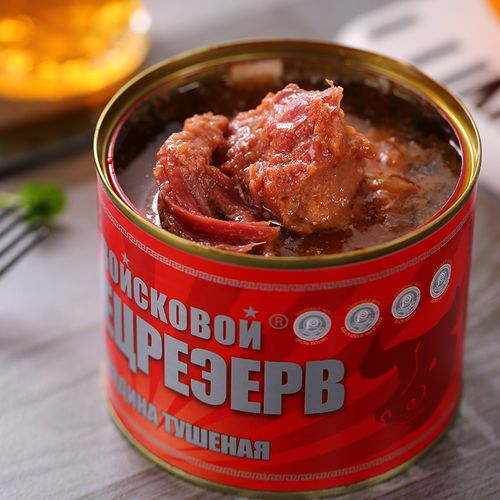
BERITA
Aplikasi Cairan Penyedap Protein Nabati Terhidrolisis dalam Produk Daging dan Ikan Kalengan
2025-01-17
Cairan bumbu protein nabati terhidrolisis semakin populer di industri makanan karena kemampuannya untuk meningkatkan rasa, tekstur, dan profil nutrisi berbagai produk makanan. Secara khusus, mereka menemukan aplikasi yang signifikan dalam daging kalengan Dan ikan produk. Cairan penyedap ini berasal dari protein nabati, seperti kedelai, kacang polong, atau beras, dan mengalami proses hidrolisis, yang memecah protein menjadi peptida dan asam amino yang lebih kecil. Proses ini meningkatkan kelarutan dan daya cernanya, sehingga ideal untuk aplikasi penyedap.
Di dalam manufaktur dari daging dan ikan kalengan, cairan bumbu protein nabati terhidrolisis digunakan untuk meningkatkan rasa, memperbaiki tekstur, dan menyediakan tambahan nilai giziKarena konsumen semakin mencari alternatif yang berbahan dasar tanaman dan lebih sehat, bumbu-bumbu ini menawarkan pilihan yang menarik untuk meningkatkan kualitas produk berbasis daging tradisional sambil mempertahankan atau meningkatkan atribut sensorik dan nutrisinya.
1. Peningkatan Rasa pada Daging dan Ikan Kalengan
Salah satu manfaat paling menonjol dari cairan bumbu protein nabati terhidrolisis adalah kemampuannya untuk meningkatkan rasa umami dalam makanan. Umami, rasa dasar kelima, sering digambarkan sebagai gurih atau daging. Protein yang dihidrolisis secara alami mengandung konsentrasi yang lebih tinggi asam amino bebas, yang berkontribusi pada rasa ini. Dalam konteks daging kalengan Dan ikan, menambahkan cairan bumbu protein nabati terhidrolisis dapat membantu menciptakan kembali rasa yang kaya dan gurih yang mirip dengan yang ditemukan pada produk berbasis hewan.
Di dalam pengolahan Untuk daging dan ikan kalengan, cairan penyedap biasanya ditambahkan ke produk sebelum atau setelah dimasak, sehingga memberikan rasa yang kuat pada produk. Hal ini sangat bermanfaat dalam ikan kaleng, yang mungkin memiliki rasa yang lebih lembut. Cairan penyedap protein nabati yang dihidrolisis dapat membuat produk lebih beraroma tanpa bergantung pada garam atau penambah rasa buatan, menjadikannya solusi ideal untuk konsumen yang sadar kesehatan.
Tabel 1: Perbandingan Bumbu Protein Nabati Terhidrolisis vs. Bumbu Tradisional
| Aspek | Bumbu Protein Tumbuhan Terhidrolisis | Bumbu Tradisional (misalnya Garam, MSG) |
|---|---|---|
| Profil Rasa | Umami, gurih, kaya | Asin, berbahan dasar monosodium glutamat |
| Kandungan Protein | Kandungan protein nabati yang tinggi | Rendah atau tidak ada |
| Daya cerna | Mudah dicerna dan tersedia secara hayati | Mungkin tidak mudah dicerna oleh semua orang |
| Nilai Gizi | Kaya akan asam amino esensial | Nilai gizi minimal |
2. Peningkatan Tekstur dan Rasa di Mulut
Selain meningkatkan rasa, cairan bumbu protein nabati yang dihidrolisis dapat meningkatkan tekstur Dan rasa di mulut dari daging kalengan Dan ikan produk. Peptida kecil dan asam amino yang dihasilkan dari hidrolisis dapat berinteraksi dengan matriks makanan, meningkatkan retensi kelembaban Dan kesegaran dari produk tersebut.
Untuk kalengan ikancairan penyedap dapat membantu mengawetkan penyerpihan Dan kelembutan daging, mencegah produk menjadi terlalu kering atau keras selama pengalengan dan penyimpanan. Demikian pula untuk daging kalengan produk, cairan protein nabati terhidrolisis dapat meningkatkan kesegaran dagingnya, sehingga terasa lebih nikmat dan empuk saat dikonsumsi.
Itu mengikat kelembaban Kemampuan protein nabati yang dihidrolisis sangat bermanfaat dalam mengurangi kebutuhan akan lemak atau minyak tambahan, yang dapat mengubah rasa atau profil nutrisi produk. Hal ini menjadikan protein terhidrolisis sebagai pilihan ideal untuk formulasi yang lebih sehat.
3. Manfaat Nutrisi pada Daging dan Ikan Kalengan
Cairan bumbu protein nabati yang dihidrolisis memberikan kontribusi yang signifikan terhadap nilai gizi dari produk daging dan ikan kalengan. Karena kaya akan asam amino, mereka menyediakan protein nabati sumber, yang dapat sangat berharga bagi kaum vegetarian dan vegan yang mungkin mengandalkan daging dan ikan kaleng untuk rasa, tekstur, atau sebagai sumber protein sekunder.
Di dalam ikan kaleng produk, penambahan cairan penyedap protein nabati terhidrolisis dapat meningkatkan kandungan protein tanpa mempengaruhi rasa keseluruhan. profil protein diperkaya lebih lanjut dengan asam amino esensial seperti lisin, metionina, Dan treonin, menjadikan produk tersebut lengkap secara nutrisi. Hal ini dapat sangat menguntungkan dalam makanan olahan Di mana fortifikasi protein sedang diminati.
Selain itu, cairan penyedap protein nabati yang dihidrolisis sering kali rendah lemak, menjadikannya pilihan yang tepat untuk menghasilkan produk yang lebih sehat daging kalengan rendah lemak dan ikan. Dengan meningkatnya kekhawatiran atas kesehatan jantung dan obesitas, konsumen semakin memilih makanan yang rendah lemak tidak sehat tetapi tetap memberikan rasa gurih yang mereka inginkan.
Tabel 2: Perbandingan Kandungan Gizi Daging/Ikan Kalengan dengan Bumbu Protein Nabati Terhidrolisis
| Tipe Produk | Kandungan Nutrisi Protein Tumbuhan Terhidrolisis | Daging/Ikan Kalengan Tradisional |
|---|---|---|
| Kandungan Protein | Kaya akan protein nabati dan asam amino esensial | Kandungan protein lebih rendah |
| Kandungan Lemak | Rendah lemak, mendukung formulasi yang sehat | Kandungan lemak tidak sehat yang lebih tinggi |
| Kandungan Natrium | Dapat disesuaikan untuk pilihan rendah sodium | Biasanya mengandung banyak sodium |
| Nilai Gizi Keseluruhan | Kaya akan vitamin, mineral, dan asam amino | Mungkin kekurangan nutrisi tambahan |
4. Pertimbangan Pembuatan dan Pemrosesan
Saat memasukkan cairan bumbu protein nabati terhidrolisis ke dalam daging kalengan Dan ikan produk, ada beberapa manufaktur Dan pengolahan Faktor-faktor yang perlu dipertimbangkan. Pilihan kapan dan bagaimana menambahkan bumbu sangat penting untuk memastikan efektivitasnya dalam meningkatkan rasa dan memperbaiki tekstur.
Aplikasi Selama Proses Pengalengan:
Cairan bumbu protein nabati yang dihidrolisis biasanya ditambahkan selama pengolahan tahap, baik sebelum atau sesudah memasak daging atau ikan. Dalam beberapa kasus, cairan dapat dicampur dengan produk mentah, sehingga protein dapat meresap ke dalam daging atau ikan saat dimasak. Dalam kasus lain, bumbu ditambahkan setelah memasak Dan pendinginan proses untuk menjaga integritas rasanya. Teknik aplikasi tergantung pada rasa yang diinginkan produk akhir dan sifat spesifik protein terhidrolisis yang digunakan.
Kelarutan dan Distribusi:
Agar bumbu dapat melapisi produk secara efektif, bumbu harus larut dengan baik dalam cairan masakan atau air garam. Kelarutan merupakan faktor kunci untuk memastikan distribusi rasa yang merata di seluruh produk. Protein nabati yang dihidrolisis biasanya memiliki kelarutan yang sangat baik, yang membuatnya ideal untuk digunakan dalam basah atau produk kalengan yang diasinkan seperti ikan.
Stabilitas:
Itu stabilitas cairan bumbu protein nabati yang dihidrolisis juga merupakan pertimbangan penting selama pengalengan proses. Karena protein-protein ini dipecah menjadi peptida yang lebih kecil, penting untuk memastikan bahwa bumbu mempertahankan rasa dan nilai gizinya selama masa simpan produk. Ini mungkin memerlukan kontrol yang cermat terhadap kondisi penyimpanan, seperti suhu dan kelembaban, serta kemasan teknik untuk mencegah penurunan rasa.
5. Permintaan Konsumen dan Tren Pasar
Permintaan untuk berbasis tanaman Dan lebih sehat Pilihan makanan terus meningkat, didorong oleh preferensi konsumen terhadap produk yang tidak hanya berkelanjutan tetapi juga menawarkan peningkatan NutrisiDaging dan ikan kalengan, secara tradisional memiliki kandungan protein hewani, semakin banyak diformulasikan ulang dengan bumbu berbasis tanaman untuk memenuhi kebutuhan berbasis tanaman segmen konsumen.
Cairan bumbu protein nabati terhidrolisis memainkan peran penting dalam inovasi ini, menawarkan cara untuk memenuhi kebutuhan konsumen yang menginginkan rasa dan tekstur daging dan ikan kaleng tradisional, tetapi dengan lebih berkelanjutan Dan diperkaya nutrisi pilihan. Tren ini diperkirakan akan terus berlanjut, dengan semakin banyaknya produsen makanan yang beralih ke bumbu protein nabati sebagai cara untuk meningkatkan produk mereka dan memperluas basis pelanggan mereka.
Cairan bumbu protein nabati yang dihidrolisis adalah alat yang ampuh dalam pengolahan, produksi, Dan manufaktur dari daging kalengan Dan ikan produk. Mereka meningkatkan rasa, meningkatkan tekstur, dan meningkatkan profil nutrisi dari produk-produk ini, menawarkan alternatif yang lebih sehat dan lebih berkelanjutan untuk metode penyedap tradisional. Karena permintaan konsumen akan makanan nabati dan lebih sehat terus meningkat, cairan penyedap protein nabati terhidrolisis akan memainkan peran yang semakin penting di masa depan industri makanan kaleng, menyediakan pilihan yang beraroma dan bergizi yang memenuhi kebutuhan konsumen yang terus berkembang.


